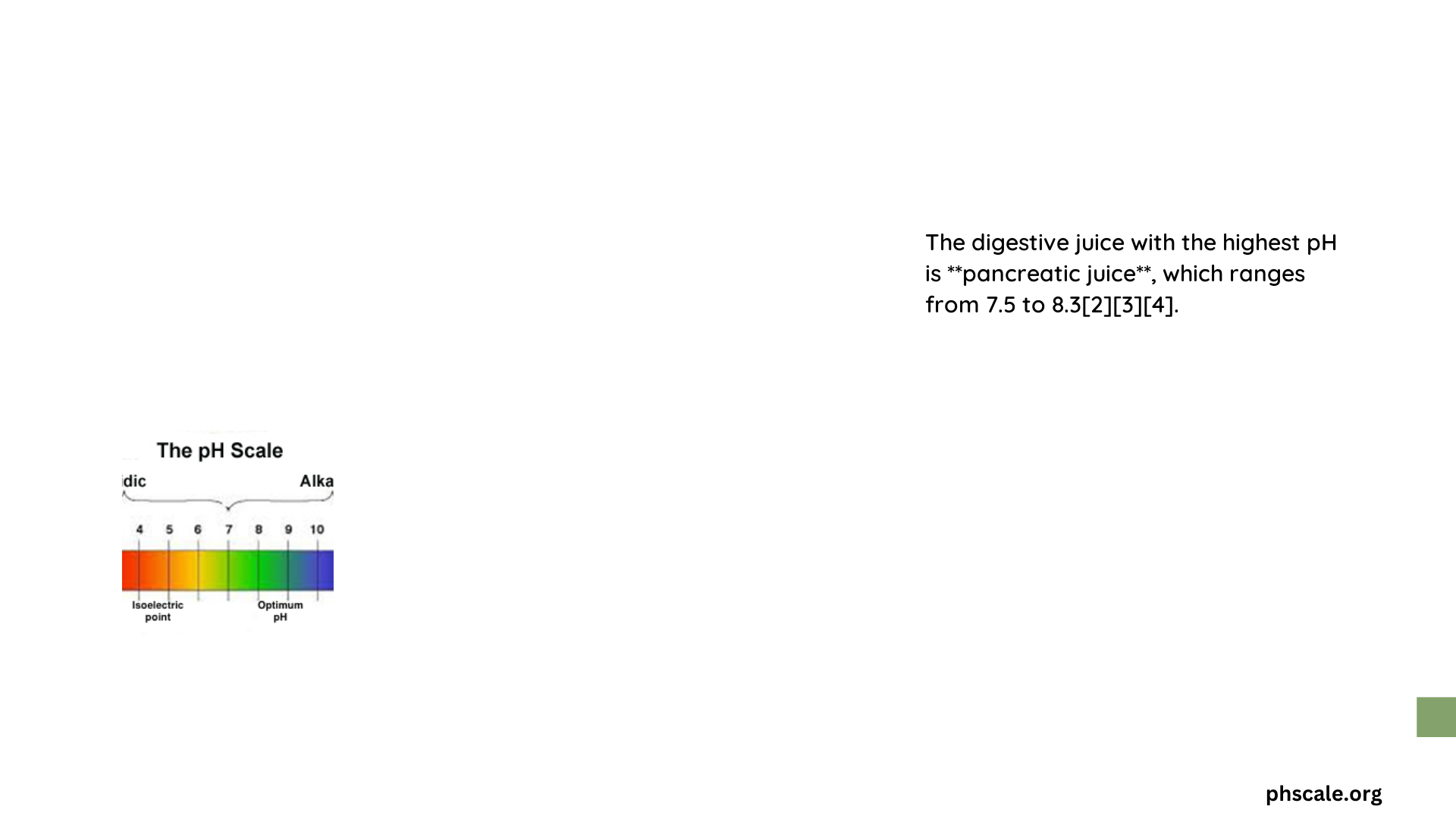Pancreatic juice stands out as the digestive fluid with the highest pH level in the human body. With a pH range of 8.0 to 8.8, it plays a crucial role in neutralizing stomach acid and creating an optimal environment for digestive enzymes. This alkaline nature is essential for proper nutrient absorption and overall digestive health. Let’s delve deeper into the world of digestive juices and their pH levels to understand why pancreatic juice reigns supreme in alkalinity.
What Makes Pancreatic Juice So Alkaline?
Pancreatic juice owes its high pH to its rich bicarbonate content. The pancreas secretes a significant amount of bicarbonate ions (HCO3-) into the pancreatic juice, which gives it its alkaline properties. This high alkalinity serves several crucial functions:
- Neutralization of stomach acid
- Creation of an optimal environment for pancreatic enzymes
- Protection of the intestinal lining from acid damage
The bicarbonate concentration in pancreatic juice can reach up to 140 mEq/L, making it a powerful buffer against acidity.
How Does Pancreatic Juice Compare to Other Digestive Fluids?

To truly appreciate the high pH of pancreatic juice, let’s compare it to other digestive fluids:
| Digestive Fluid | pH Range | Characteristic |
|---|---|---|
| Gastric Juice | 1.5-3.5 | Highly Acidic |
| Bile | 7.8-8.6 | Slightly Alkaline |
| Pancreatic Juice | 8.0-8.8 | Most Alkaline |
| Saliva | 6.5-7.5 | Near Neutral |
| Intestinal Juice | 7.5-8.0 | Mildly Alkaline |
As we can see, pancreatic juice stands out with its high alkalinity, surpassing even bile in pH level.
Why Is the High pH of Pancreatic Juice Important?
The elevated pH of pancreatic juice is not just a biological curiosity; it serves critical functions in digestion:
- Acid Neutralization: It neutralizes the highly acidic chyme from the stomach, protecting the small intestine.
- Enzyme Activation: Many pancreatic enzymes function optimally in an alkaline environment.
- Nutrient Absorption: The alkaline pH facilitates the absorption of nutrients in the small intestine.
- Pathogen Defense: The alkaline environment helps prevent the growth of harmful bacteria.
What Happens If Pancreatic Juice pH Is Disrupted?
Disruptions in pancreatic juice pH can lead to various digestive issues:
- Pancreatic Insufficiency: Reduced bicarbonate secretion can lead to inadequate neutralization of stomach acid.
- Malabsorption: Improper pH can hinder the activity of digestive enzymes, leading to poor nutrient absorption.
- Increased Risk of Infections: A less alkaline environment may allow harmful bacteria to thrive.
How Is Pancreatic Juice pH Regulated?
The pH of pancreatic juice is tightly regulated through several mechanisms:
- Hormonal Control: Secretin stimulates bicarbonate secretion.
- Neural Regulation: The vagus nerve influences pancreatic secretions.
- Feedback Mechanisms: The presence of acid in the duodenum triggers increased bicarbonate secretion.
Can Diet Affect Pancreatic Juice pH?
While diet doesn’t directly alter pancreatic juice pH, it can influence overall digestive health:
- Alkaline Foods: Consuming alkaline-forming foods may support pancreatic function.
- Hydration: Adequate water intake helps maintain proper electrolyte balance.
- Balanced Diet: A diet rich in fruits, vegetables, and whole grains supports overall digestive health.
What Are the Clinical Implications of Pancreatic Juice pH?
Understanding the high pH of pancreatic juice has important clinical implications:
- Diagnostic Tools: Measuring bicarbonate levels in pancreatic juice can help diagnose pancreatic disorders.
- Treatment Strategies: Enzyme replacement therapies often include bicarbonate supplements to mimic natural pancreatic juice.
- Research Focus: The unique properties of pancreatic juice inspire research into novel treatments for digestive disorders.
How Does Pancreatic Juice pH Relate to Other Bodily Functions?
The alkaline nature of pancreatic juice has far-reaching effects:
- Acid-Base Balance: It contributes to the body’s overall acid-base homeostasis.
- Gut Microbiome: The alkaline environment influences the composition of gut bacteria.
- Mineral Absorption: The pH affects the absorption of minerals like calcium and iron.
In conclusion, pancreatic juice, with its remarkably high pH, plays a pivotal role in digestion and overall health. Its alkaline nature, unmatched by other digestive fluids, underscores the complexity and precision of the human digestive system. Understanding the importance of pancreatic juice pH opens doors to better digestive health management and potential therapeutic interventions.
References:
1. Gastric Acid – Wikipedia
2. The Impact of Gastric Juice pH on the Intraluminal Therapy for Helicobacter pylori Infection
3. Intestinal and fecal pH in human health – Frontiers
4. Pancreatic Secretion – StatPearls – NCBI Bookshelf
5. Regulation of Pancreatic Secretion – Physiology – NCBI Bookshelf
